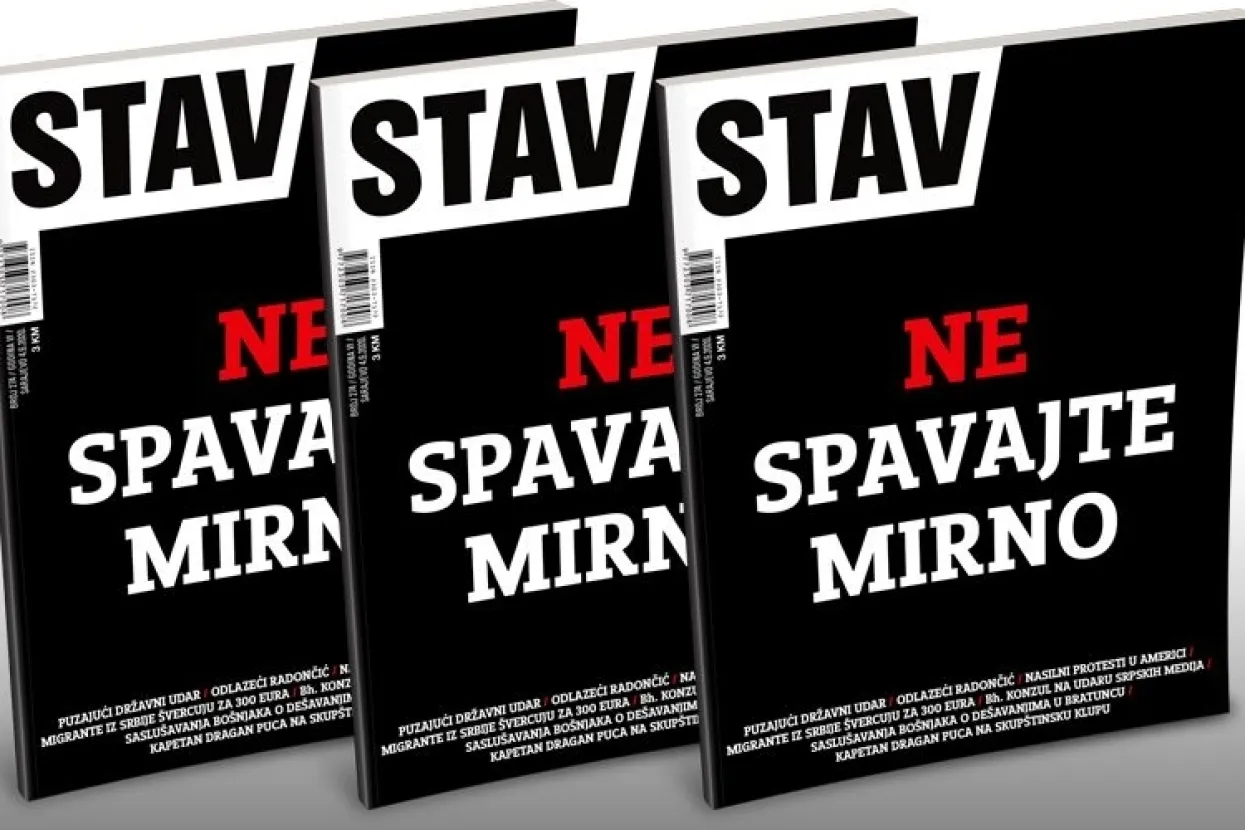
Magazin Stav
Encouraging the defamation campaign: Bosniak magazine characterizes Croats as "anti-state element", rejoices at their biological disappearance
Stav goes further, and problematizes the fact that the Croatian media in BiH can be followed in Sarajevo as well. At the same time, Stav indirectly marks the Croatian citizens in BiH as fascists.
That the Bosniak public has completely lost its compass and is rapidly producing a toxic social atmosphere is not special news. However, the magazine Stav, the (un)official newsletter of the largest Bosniak party - SDA, went a step further and marked the entire Croatian people as an „anti-state element“, while cheering for the Croats biological disappearance.
The magazine Stav, financed by Turkish money, otherwise known as the (un)official SDA newsletter, published an article today in which it satanizes the Croatian population in Bosnia and Herzegovina, clearly labeling them as an „anti-state element“ with all the connotations that arise from such a view.
Stav published a horrific article describing how Herzeg-Bosnia still lives in Croat-majority municipalities in Bosnia and Herzegovina, and directly accuses the Croat people of non-functioning government in the BiH Federation entity, a joint Croat-Bosniak entity.
„Although BiH Croats played a positive role in the referendum for the independence of Bosnia and Herzegovina, their separatism through the Herzeg-Bosnia project, later the Croat Self-Government, and the actions of HDZ BiH and HNS makes them an anti-state element that openly cooperates with Dodik“, Stav writes without hesitation, shamelessly declaring the entire Croatian people an „anti-state element“.
But that's not all. Stav goes further, and problematizes the fact that the Croatian media in BiH can be followed in Sarajevo as well. At the same time, Stav indirectly marks the Croatian citizens in BiH as fascists.
„It is worth reminding those Bosniaks and pro-Bosnian citizens who do not have frequent contact with Mostar and other Croat-majority municipalities, which were part of the so-called Herzeg-Bosnia, that this fascist creation still lives on in the names of many institutions and media. Even Herzeg-Bosnia radio is very well heard in the Sarajevo area. The position of Bosniaks in the municipalities that were part of the territory of Herzeg-Bosnia can be compared to the treatment of the authorities in South Africa towards the black population until 1994. Such a situation has been the daily experience of Bosniaks in Kreševo and Kiseljak for more than two decades, who are only 20 minutes away from Sarajevo by highway. Only Bosniak returnees in Stolac and Čapljina are in harder position than them. Positive exceptions are evidenced by the situation in Prozor, where the HDZ 1990 mayor is in power thanks to Bosniak votes, and in Posavina, where no conflict between the two peoples was ever recorded, because suffering from Serbs and betrayal of official Zagreb and Mostar united them in battle and return.“
The Croatophobia expressed by Bosniak mainstream media towards Croats is perhaps easiest to see through the following scandalous paragraph:
„The absurdity of choosing space for various institutions and companies is particularly pronounced. For example, in Kiseljak, BH Telecom is located in a building owned by a Croat, instead of the Majlis Center, which was purposely built for such needs.“
In the same article, Stav offers a reason for optimism to its Bosniak public, and the reason is passionate support for the Croat demographic disappearance from the BiH territory. Thus, Stav delights its audience by cheering for the biological disappearance of Croatian citizens from the territory of today's state of BiH.
„One of the reasons why Čović's policy has been so exclusive in recent years lies in the very pronounced negative demographic trends that, according to some analysts, have already lowered BiH Croats below 10 percent. The census results in neighboring Croatia showed, among other things, that the demographic base is no longer sufficient to annul mortality and emigration, which diminishes the interest of the Croatian government and the public for their compatriots in BiH. If we compare the 1991 and 2013 censuses, we will see that Croats lost the majority in Vareš and Novi Travnik, and now in Busovača too. In the next two to three election cycles, due to the demographic loss, it is likely that Croats will not be the majority in Mostar, Vitez, Kiseljak, Žepče, Stolac. After that, the matter of the Bosniak political organization to make demographic change official through elections remains open.“
It is noticeable that Stav supports the Croats disappearance in those municipalities where they are in significant contact with Bosniaks, such as Mostar, Stolac, Žepče and Kiseljak.
„Due to the aforementioned negative processes, Čović is playing for all or nothing in order to complete the territory of Herzeg-Bosnia, because he knows very well that when demographic changes are reflected in the election results, that will be his definitive end.“
Such hate-filled articles only reinforce the need for Croats to leave the federation with Bosniaks in the BiH Federation entity.
Dnevnik.ba